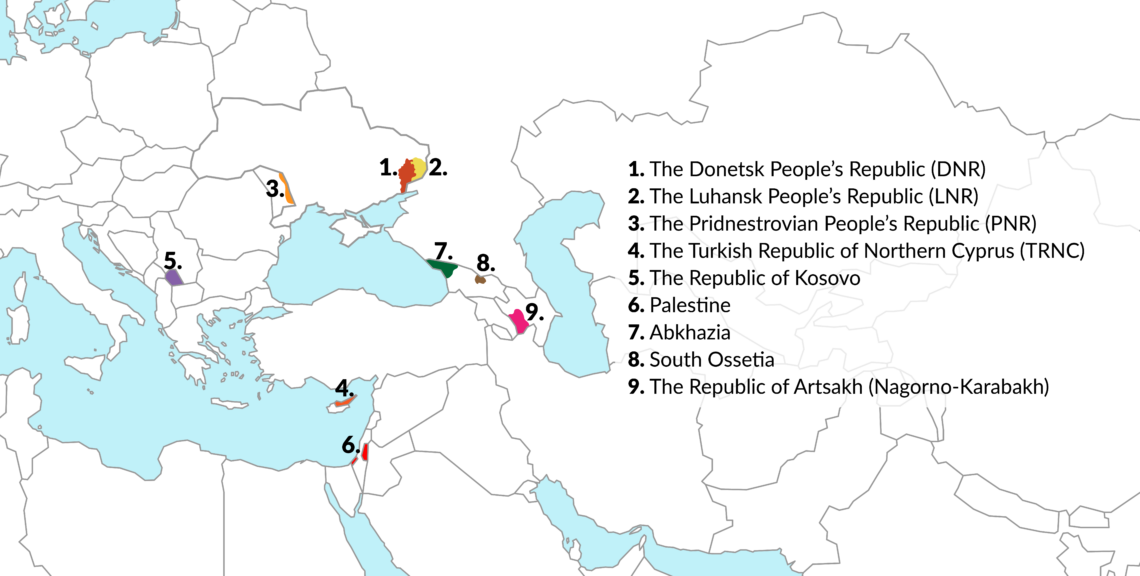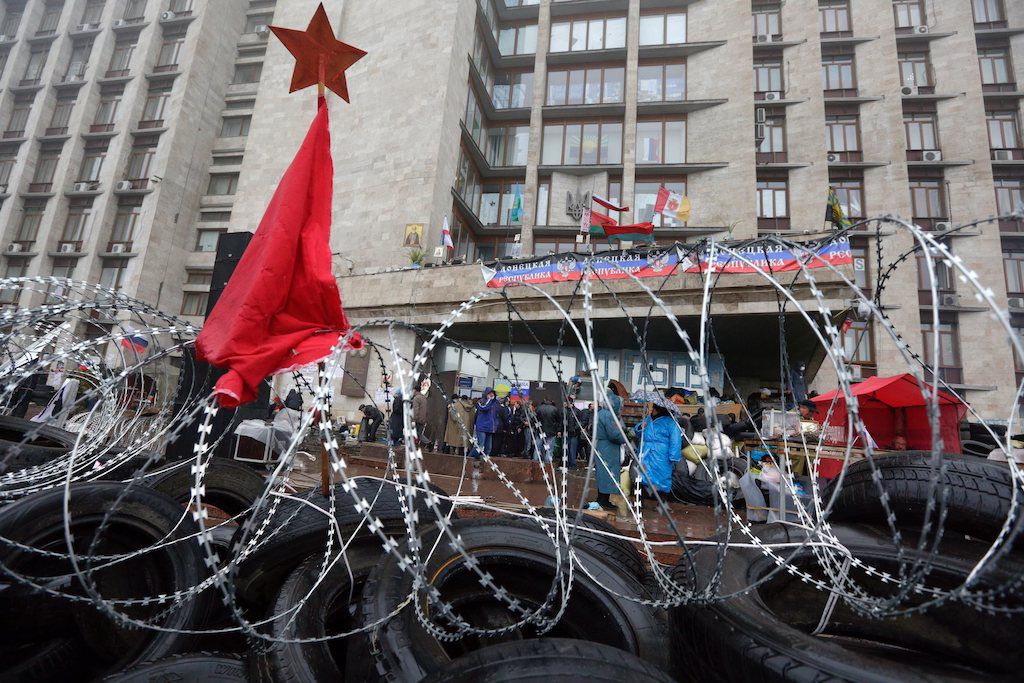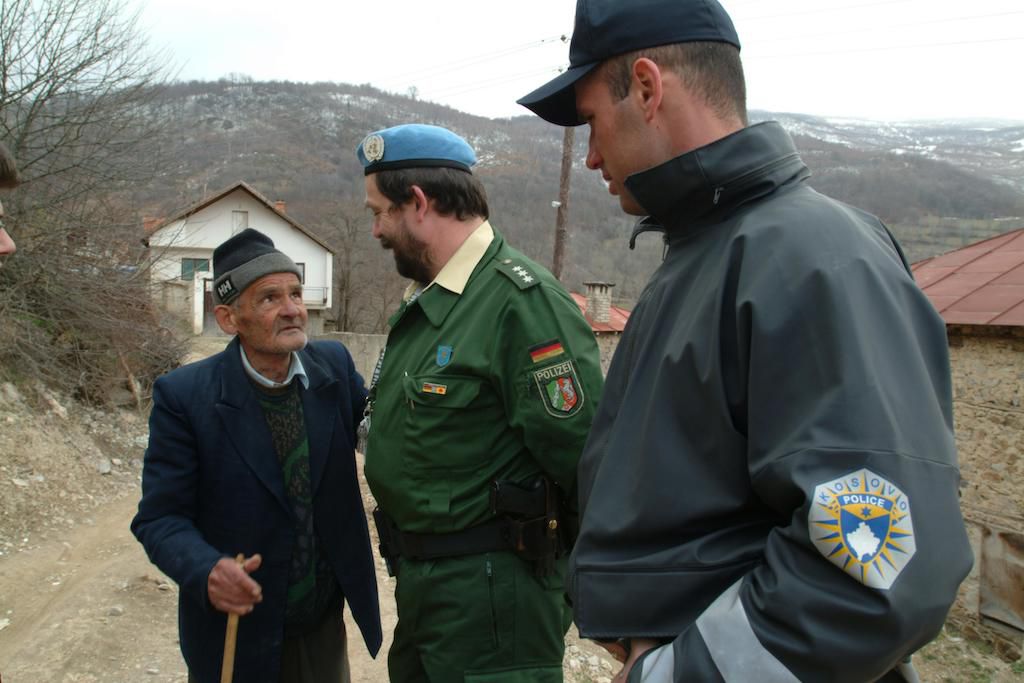Nonrecognition and trouble in international relations
Detaching and protecting a part of the territory of a weaker state has become a surrogate for an armed conflict. Pseudo-state entities emerging in such detachments have considerable staying power, despite being expensive to maintain. Their existence undermines regional security and complicates the conduct of international relations.

In a nutshell
- State-like entities with no international recognition survive because of support, military and financial, from sponsor states
- Pseudo-states are proliferating even though they undermine security and complicate the conduct of international relations
- Big geopolitical players find such entities useful, so don’t expect quick normalizations of their status
The crisis in Ukraine has brought into focus a highly troublesome phenomenon in international relations – captured territories that behave as internationally-recognized states. The conflict zone in the Donbas region has resulted in the emergence of two such self-proclaimed entities – the Donetsk People’s Republic (DNR) and the Luhansk People’s Republic (LNR). Outwardly, they appear to feature all the trappings of legitimate states, from flags and crests, and constitutions, to fiscal and foreign policy.
Although neither could exist without support – military and financial – from the Russian Federation, not even the Kremlin has seen fit to recognize their statehood officially. It has cold-shouldered proposals for them to be incorporated into the federation. At the same time, Russia demands that both should be recognized as partners in talks with the legitimate government of Ukraine.
Proliferation of pseudo-states
The Russian leadership derives benefit from the resulting diplomatic gray zone. It exercises considerable control over domestic developments in Ukraine while reserving the right to claim complete noninvolvement in the associated violence. Whether these benefits are substantial enough to outweigh the costs is an academic question. The international record demonstrates that creations like the DNR and the LNR exhibit considerable staying power.

An excellent example is the Turkish Republic of Northern Cyprus (TRNC), created in 1983 in the wake of the 1974 Turkish invasion on the island. The only United Nations member state that has recognized the TRNC’s declaration of independence (DOI) is Turkey. Pakistan and Bangladesh did initially offer recognition, but once the UN Security Council declared the DOI invalid, both withdrew their recognitions.
To the patron state, nonrecognition brings a host of troubles.
Despite being a constant source of friction between the two NATO members – Greece, which supports the parent state Cyprus, and Turkey, which acts as patron state for the TRNC – the partition of Cyprus shows no signs of going away. The status quo is maintained via a strong Turkish military presence.
The proliferation of non-recognized territorial entities parading as states has both economic and political implications. To the concerned populations, it means living in a depressed economy subjected to international sanctions and trade embargos, on top of restrictions on travel over contentious passport issues. An inevitable erosion of human rights follows, as the international community is deprived of leverage.
To the patron state, it brings a host of troubles ranging from international censure and sanctions to the responsibility for maintaining order and welfare in a territory where outside sanctions wreak havoc on payment systems and able-bodied young people look for ways out.
To the international community, such “states” are no joy either. Their territories become safe havens for criminal organizations engaged in human trafficking, drug running, arms trade and money laundering. Add to that a growing burden on resources devoted to negotiations, peacekeeping and conflict management, at a time when such assets are spread thin.
Why they do it
Despite Moscow’s knowledge that the proliferation of non-recognized entities is contrary to the interests of all internationally recognized states, including Russia’s, there are reasons why the number of such entities has grown. Detaching and protecting a part of the territory of a weaker state has become a surrogate for traditional armed conflict. As demonstrated in the case of Ukraine, such detachments have considerable implications for the conduct of international relations.
Diplomatic recognition is an important part of international law, which, in turn, constitutes the bedrock of orderly conduct of international relations. The UN has been created as a forum for recognized states to do business together. Despite laborious efforts to put forth clear-cut rules, however, the question of international legal recognition of statehood remains a tricky one.
For example, unanimity is the rule, but there are exceptions. One such pertains to states that have failed to win recognition from at least one member of the UN, ranging from the Republic of China (Taiwan) and the two Koreas to Armenia and the State of Israel. The states that object to recognition disrupt trade and other forms of international relations.
International law favors continuity. States that have offered recognition of other countries are under legal obligation not to recognize challenges to the sovereignty of those states. Yet, politics sometimes trump obligations. A recent case in point is Venezuela, where 54 countries sympathetic to the United States challenged the incumbent president Nicolas Maduro by recognizing opposition leader as president.
The lack of clarity in the relation between politics and the law is reflected in DOIs that win broad, but far from universal, recognition.

Hard roads to recognition
The State of Palestine is one such example. Proclaimed in 1988, it has to date won recognition from 137 UN member states. An important reason for the lack of unanimity is that Palestine fails to live up to the three commonly agreed criteria of statehood: having a defined territory; a permanent population; a government that has sovereignty and jurisdiction over its territory plus the ability to conduct foreign relations. Israel does not recognize Palestine’s statehood, and the UN regards the area as occupied. The European Union remains deeply divided, with nine out of 28 member states having offered recognition.
A second example is the Republic of Kosovo. Proclaimed in 2008, it has to date been recognized by 102 UN members. In contrast to Palestine, which remains fully controlled by Israel, Kosovo has been detached from Serbia and placed under international administration by the UN and the EU. The latter arrangement has allowed Kosovo to become a member of several international organizations. Yet its limited recognition depresses both trade and foreign investment.
The Kremlin uses a full spectrum of approaches to the territories detached from their parent states.
In both affairs, Russia has played and may still play significant roles. In the case of Kosovo, the Kremlin first objected forcefully to the DOI, claiming it violated international law and would set a dangerous precedent. When it subsequently proceeded to annex Crimea, Russia referred to the case of Kosovo, camouflaging its illegal annexation behind a smokescreen of politics. In the case of Palestine, the possibility of Israeli annexation is increasingly likely. Russian ties with Israel have warmed, and although the situation is different from Crimea, it is plausible that the Kremlin could accept such an outcome.
Looking closely at the cases involving Russia, the Kremlin has deployed a full spectrum of approaches in dealing with territories it has been actively involved in detaching from their parent states. The approaches range from annexation and recognition to nonrecognition.
The most extreme is Crimea. The costs resulting from the annexation reflect all the problems spelled out earlier – the international censure and embargo that has disrupted trade and investment, caused a collapse of the payment system and forced the patron state to assume responsibility for areas like currency, water and electricity supplies. The building of a bridge spanning across the Kerch Strait alone required very substantial outlays.
Russia recognizes – or not
A less extreme case is Georgia and its two breakaway republics, Abkhazia and South Ossetia. Once created as autonomous regions within the Georgian Soviet republic, the territories began acting to achieve independence toward the end of the Soviet era. Bloody wars ensued. After the kinetic part was over, Russia assumed the role of a mediator, ultimately deploying peacekeepers.
Following the 2008 Russo-Georgian war, Russia decided to recognize the Republic of Abkhazia and the Republic of South Ossetia. The fact that this took place six months after Kosovo’s DOI may have played into the Russian decision, which is regarded today as a big mistake.
The only other UN members that have recognized Abkhazia and South Ossetia are Nicaragua, Venezuela, Nauru and Syria (the latter in May 2018). Vanuatu and Tuvalu offered early recognition but subsequently withdrew those decisions. The Kremlin was particularly irked by the fact that not even Belarus supported its action, and it has been concerned by the negative reactions from several other friendly states such as China and Kazakhstan.
Many non-recognized entities exhibit formal similarities in pretending to be states.
A case where Russia has opted not to offer recognition is the Pridnestrovian People’s Republic (PNR), declared in 1990. More widely known as Transnistria, it is a tiny slice of Russian-populated land along the eastern bank of the Dniester River, bordering on Ukraine. During the Soviet era, it was part of the Moldovan Soviet Republic and home to the Soviet 14th army. Following a brief war of insurrection, the area has been effectively detached from Moldova. Like the DNR, the LNR and the TRNC, this “republic” has developed the trappings of statehood. It is sustained by a military force from the patron state. Like the other three, it has also failed to win recognition from any UN members.
Another case, only marginally relevant to Russia, is the Republic of Artsakh. Declared in 1991, it is more commonly known as Nagorno-Karabakh, an Armenian-populated enclave within the former Azerbaijan Soviet Socialist Republic. The first signs of its ambition to break free and to integrate with Armenia were reported in 1988. Following a war with Azerbaijan, Armenian forces have occupied its area. Yerevan has assumed the role of a patron state,deterring ambitions from Baku to recapture the territory.
Artsakh has not been recognized by any UN members, not even by Armenia or Russia. Although Russia is aligned with Armenia and has a big military base there, in the conflict over Artsakh it acts as a balancing force, ready to supply weapons to both sides.
Faux normalcy
Although the group of non-recognized states is a somewhat mixed lot, the entities involved do exhibit many formal similarities in pretending to be states. They have governments, police forces, border controls and security structures. People pay taxes and motorists stop at red lights. Some, like Abkhazia, have even succeeded in developing a façade of welfare and good order, with townscapes marked by trendy restaurants and cafes.
Their leaders have also developed intensive links within the group, ranging from mutual diplomatic recognitions to international trade and even a football cup of their own, the CONIFA. It is striking that among the entities with Russia as a patron state, most of the diplomatic activity is aimed at others in the same situation.
There are good reasons why these entities are so busy offering congratulations and condolences to faraway countries that cannot influence their well-being: the charades of international normalcy beef up the self-esteem of local elites. This psychological mechanism enhances their commitment to work closely with other such groups.
It also offers a handy propaganda tool for domestic consumption, an excuse to blame foreign states for dire material conditions at home: “don’t you see, we are on our best behavior, but they discriminate against us!” The question then becomes whether all this is sustainable; the answer is affirmative.
Scenarios
Scenario 1
One scenario that may be dismissed out of hand is of such entities winning recognition and becoming integrated into the normal conduct of international relations. The parent states – Cyprus, Georgia, Moldova and Ukraine – would not accept this and they would receive broad international support for their stand. More importantly, winning international recognition would be a disaster to the local elites, shutting down their access to lucrative criminal ventures.
Scenario 2
Another unlikely scenario is the EU acting as a stabilizing force in its “near abroad,” paving the way for eventual normalization. Following the war in Georgia, the EU adopted the principle of “engagement without recognition.” But despite the goodwill, little of significance has come of this ambition. From 2008 until 2016, for example, Russian pension payments alone were 10 times the size of total EU support for various noble causes in Abkhazia.
The issuance of Russian passports has introduced a particular problem. Young people in Abkhazia could, for example, accept EU scholarships if they traveled on Georgian passports, but doing so would be socially unacceptable at home.
Scenario 3
A third unlikely scenario is that the non-recognized entities are simply folded back into their parent states. Barring the exceptional case of Palestine, a strong military presence from the patron states ensures that this will not happen. Even if the patrons were to withdraw military support, it is not entirely clear that the game would be over. Government forces would likely overrun the DNR and the LNR, but Abkhazia, Artsakh and the PNR would put up serious resistance.
This leaves the critical question of how Russia will view the costs and benefits involved in continued interaction with these pseudo-states.
The upside is that there is a good deal of cooperation and mutual learning within the group, involving governments, lawmakers and security structures. Support from Abkhazia, in particular, has been very helpful for the DNR and the LNR. Rumors have it that Abkhazia may even become a transit zone for the export of coal from Donbas to Turkey, evading sanctions and generating revenue for the local governments. South Ossetia has emerged as an offshore company of sorts, facilitating financial transactions between Russia and the DNR/LNR. Being locked in between Ukraine and Moldova, the PNR has played a more peripheral albeit not entirely insignificant role.
The downside is that dealing with local warlords offers challenges of its own. In Donbas, there have been targeted killings of renegade rebel leaders, and a murky military invasion by the DNR into the LNR. Even more stable entities like Abkhazia cannot be trusted to be completely obedient. Russian elites have been rebuffed in their ambitions to make large purchases of prime real estate there.
But weighing costs and benefits does not change the fundamental conclusion, which is the de facto states are here to stay. The Kremlin may feel it made a mistake in recognizing Abkhazia and South Ossetia, but that cannot now be undone. It may also regret its support for the DNR and the LNR, but that is also an outcome it will have to live with.
Over and above the fiscal burden on the Russian Federation, and on Turkey, this implies that the problems associated with keeping these entities alive are also here to stay.
Beyond the fact that millions of people have been reduced to life as second-class citizens, shortsighted political expedience is eroding the bedrock of international law. This turns issues of diplomatic recognition into ad hoc arrangements that divide the international community and undermine the role of legal treaty obligations.







